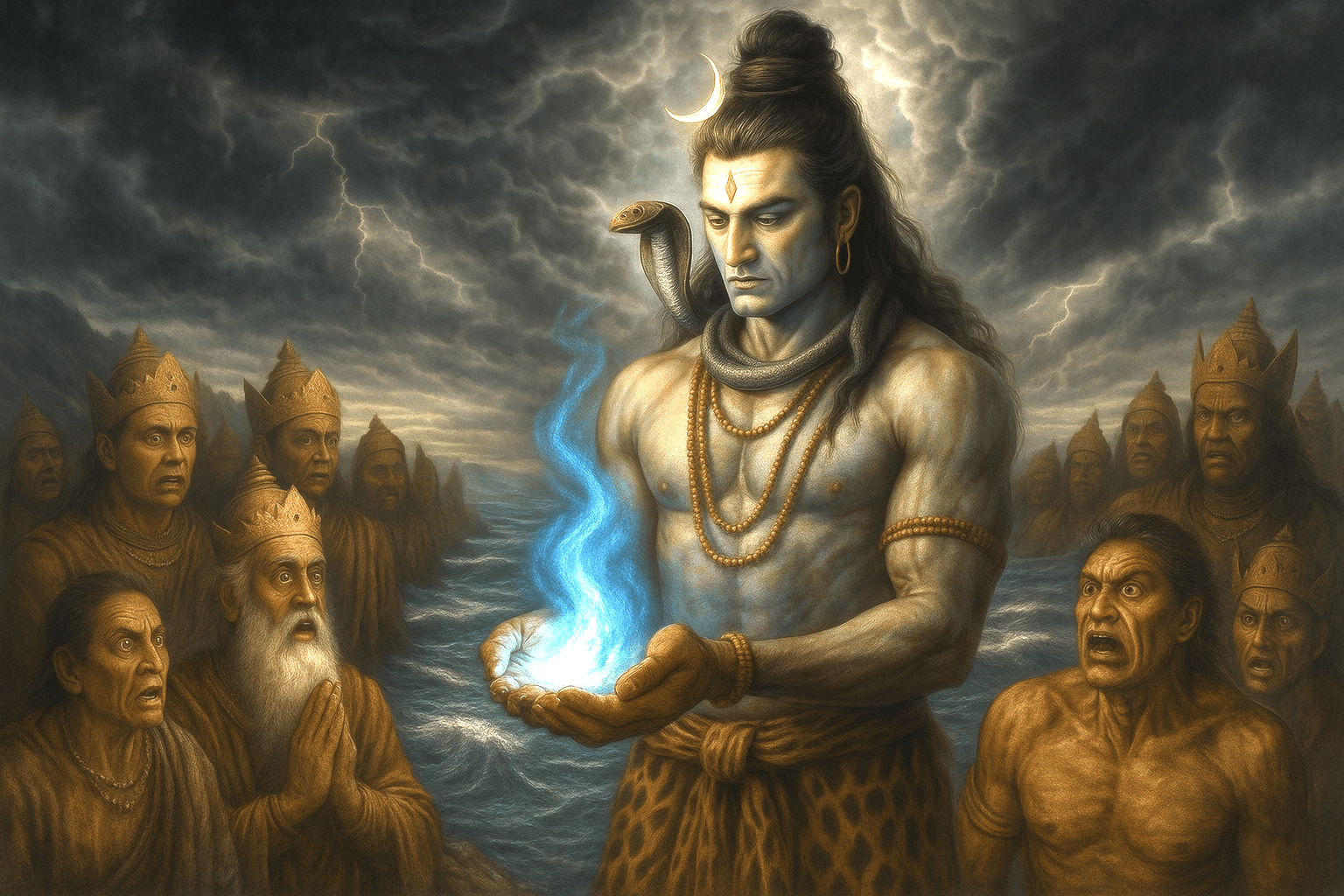🕉️ Introduction
In the vast canvas of Sanatan Dharma, Lord Shiva stands as the ultimate embodiment of destruction, compassion, and transcendence. Among countless tales of his divine interventions, one story shines bright — the story when Shiva drank the deadliest poison to save the entire universe. The story of Neelkanth.
This isn’t just a myth; it’s a timeless lesson on sacrifice, patience, and divine courage.
🌊 The Beginning – Samudra Manthan
Once upon a cosmic time, the Devas (gods) and Asuras (demons) were locked in an eternal battle. Weary from continuous wars and defeats, the Devas sought refuge in Lord Vishnu, who advised them to churn the cosmic ocean (Samudra Manthan) to obtain Amrit – the nectar of immortality.
However, the task was not easy.
Mount Mandara was used as the churning rod and the serpent king Vasuki as the rope. The Devas and Asuras pulled Vasuki from both sides to churn the ocean.
🧪 Emergence of the Deadliest Poison – Halahal
As the churning began, numerous treasures emerged: Kamdhenu, Airavat, Kalpavriksha, Lakshmi Devi, and more. But before Amrit could arise, an unthinkable catastrophe occurred.
A dense, black, and lethal liquid started surfacing from the ocean. It was not just ordinary poison — it was Halahal, a venom so potent that even its fumes began destroying everything around — trees withered, rivers dried, birds fell from the sky, and gods began suffocating.
The entire universe trembled under the impact of the poison. Death and destruction loomed everywhere.
Panic spread. The Devas rushed to Brahma, but he couldn’t help. Vishnu too remained still — he looked at one direction.
🙏 The Only Hope – Mahadev
Everyone turned to Lord Shiva, the great ascetic, the one who is beyond life and death.
The Devas and sages rushed to Mount Kailash, where Lord Shiva sat deep in meditation with his eyes closed and Parvati by his side. Upon hearing their cries, Shiva opened his eyes — calm, glowing with divine grace.
Without any hesitation or second thought, Lord Shiva stood up and walked towards the poison.
He did not ask anyone to help. He did not discuss. He did not wait.
Because he is Shiva — the one who protects without expecting anything in return.
🧿 The Sacrifice – Swallowing the Poison
Mahadev cupped his palms and collected the deadly Halahal in them. Every god and demon watched in awe and fear.
He drank the poison in one breath.
But instead of swallowing it into his stomach, he held it in his throat, stopping the poison from reaching his heart.
Such was the potency of the Halahal that even in his throat, it began burning like fire. The divine blue poison started radiating through his skin. His throat began to glow a deep celestial blue.
The universe had been saved — but the savior now carried unimaginable pain.
Parvati, witnessing this sacrifice, gently held his neck to stop the poison from spreading — this divine act gave Shiva the name Neelkanth, meaning “The One with the Blue Throat.”
🌀 The Cosmic Meaning Behind Neelkanth
Shiva’s act was not just a physical sacrifice — it symbolized the deepest spiritual truth:
- Sometimes, you must absorb negativity to protect the world
- But like Shiva, you don’t let it destroy you — you hold it, transform it, and stay detached
- The poison did not define him — his control over it did
This tale is the metaphor for inner poison we all carry — jealousy, anger, ego. Lord Shiva teaches us: don’t suppress, don’t spit it out on others — learn to hold it with awareness.
🌌 Aftermath – A Universe Restored
With the poison neutralized, the cosmic churning continued. Finally, Amrit emerged, which was eventually distributed with divine balance (with help from Lord Vishnu in Mohini form).
But in everyone’s heart, the act of Shiva remained eternal. No one had asked him. No one had commanded. Yet, he bore the burden silently, not for fame, not for power — but out of unconditional compassion.
This was not just a victory over poison.
It was the triumph of Dharma over destruction, of divine sacrifice over selfishness.
🕯️ Legacy of Neelkanth
Even today, Shiva is worshipped as Neelkanth, the protector who drinks our sins and sorrow. Devotees chant:
“Trayambakam Yajamahe, Sugandhim Pushtivardhanam
Urvarukamiva Bandhanan, Mrityor Mukshiya Maamritat.”
He who can absorb death, can surely bless life.
🙏 FAQ’s
❓ Why is Lord Shiva called Neelkanth?
Lord Shiva is called Neelkanth because he held the deadly Halahal poison in his throat during the Samudra Manthan. The poison turned his throat deep blue, giving him the name “Neelkanth” (Neel = blue, Kanth = throat).
❓ What is the significance of Lord Shiva drinking the Halahal poison?
Shiva drinking the poison symbolizes ultimate sacrifice and compassion. It shows how he absorbed the negativity of the world to protect creation, without letting it affect his inner peace or balance.
❓ Did Lord Shiva swallow the poison?
No, Lord Shiva did not swallow the poison. He held it in his throat to prevent it from spreading within his body or the universe. This act required immense yogic control and spiritual power.
❓ What happened to Lord Shiva after he drank the poison?
After drinking the poison, Shiva’s throat turned blue due to the intensity of the Halahal. He came to be known as Neelkanth. Despite the pain, he remained calm, meditative, and unaffected.
❓ What does the story of Neelkanth teach us?
The story teaches that true strength lies in restraint and sacrifice. Shiva shows us how to absorb pain and negativity without reacting or harming others — a lesson in self-control, detachment, and compassion.
❓ What role did Goddess Parvati play in the Neelkanth story?
Goddess Parvati gently held Shiva’s throat as he drank the poison, stopping it from descending further. Her divine touch helped Shiva contain the poison safely in his throat.
❓ Is the Halahal poison symbolic?
Yes. The Halahal poison symbolizes negativity, ego, and chaos. Shiva’s act of holding it shows how we must face life’s darkness with awareness and calm, without letting it take over our being.
❓ Was Neelkanth’s sacrifice recognized by the gods?
Absolutely. All Devas and Asuras bowed in reverence to Shiva’s unmatched sacrifice. He did not do it for glory, yet it became one of his most glorified and divine acts in Hindu mythology.

